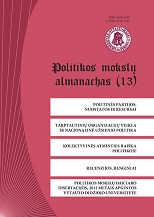Atminties politika Baltijos šalyse : dvi probleminės sritys
Politics of memory in the baltic states: two fields of analysis
Author(s): Tomas StatkevičiusSubject(s): Politics / Political Sciences
Published by: Vytauto Didžiojo Universitetas
Keywords: Atminties politika; Baltijos valstybės; postkomunizmas; tautiniai naratyvai; politics of memory; Baltic States; post-communism; national narratives
Summary/Abstract: Kolektyvinė atmintis yra būtinas kiekvienos šiuolaikinės politinės bendruomenės požymis. Lietuvoje, ypač Latvijoje ir Estijoje, nesiliaujantys „atminties karai“ sąlygoja augančią atminties ir istorijos politikos supratimo svarbą. Politinio elito konsolidacijos trajektorijos (pirmaisiais pokomunistinės transformacijos metais) ir istorinės sąmonės tradicijos tapo pagrindiniais veiksniais, nubrėžiančiais atminties politikos gaires trijose Baltijos valstybėse. Straipsnyje mėginama palyginti ir apibendrinti Baltijos valstybių atminties politikos raidos tendencijas, išskaidant jas į dvi viena kitą papildančias problemines sritis – sovietmečio patirties aktualizaciją ir tautinio naratyvo patiriamą įtampą istorijos liberalizacijos procese. Collective memory is a necessary attribute to every modern political community. In recent years, never-ceasing “wars of memory” in Lithuania and especially in Latvia and Estonia determine the importance of understanding the policy of history and memory. The trajectories of consolidation of political elite at the beginning of transformation period and traditions of historical consciousness became the fundamental factors which underlie the guidelines of the policy of memory in the three Baltic States. In this article the tendencies of politics of memory in the Baltic States are compared and generalized. By doing this those tendencies are distinguished into two different, although partly complementary spheres: the actualization of soviet memory and the tensions of national narrative that are caused by the processes of “liberalization” of history. Politics of memory are much more liberalized in Lithuania than in Latvia and Estonia. Part of the reason is the successful transformation of former communist party which reinforced the discourse of rehabilitation of soviet memory as stable, industrializing and modernizing period in Lithuania’s history. The “liberalization” could also be felt in terms of deconstruction of national narrative. The most important role is appointed for Grand Duchy of Lithuania as tolerant and legalistic state and the rejection of searching of ethnic attributes of Duchy. In Latvia and Estonia the assertive rejection to partly rehabilitate the Soviet memory still dominates. This was influenced by the absence of sound ex-communist party and tradition of political elite to seclude the parties of Russian minority from ruling coalitions. Soviet history is depicted as an enslavement of titular nations and this depiction consistently supplements the traditional national narrative.
Journal: Politikos mokslų almanachas
- Issue Year: 2013
- Issue No: 13
- Page Range: 137-158
- Page Count: 22
- Language: Lithuanian

